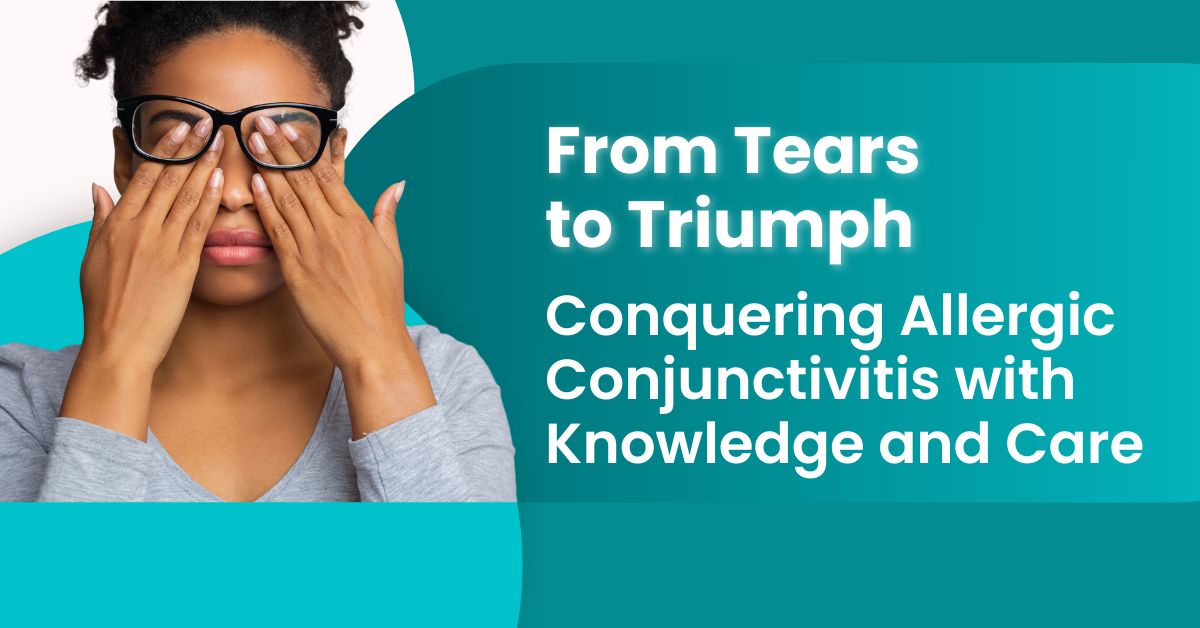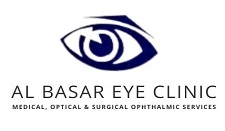
When eyes become the battleground for an invisible war, where itching, tearing, and discomfort reign supreme, it’s time to unveil the untold story of allergic conjunctivitis and arm ourselves with the knowledge to conquer it.

Allergic conjunctivitis is a common eye condition that affects many individuals, causing discomfort and irritation. This occurs when the conjunctiva, the thin tissue lining the eyelids and covering the whites of the eyes, becomes inflamed due to an allergic reaction. It is typically triggered by exposure to allergens such as pollen, pet dander, dust mites, or certain medications. When these allergens come into contact with the eyes, the immune system releases histamines and other chemicals, leading to inflammation and irritation.
Types and Symptoms of Allergic Conjunctivitis
There are different types of allergic conjunctivitis, including:
- Seasonal Allergic Conjunctivitis (SAC): Commonly associated with seasonal allergens like pollen and mold spores, SAC occurs during specific times of the year when allergen levels are high.
- Perennial Allergic Conjunctivitis (PAC): Unlike seasonal allergic conjunctivitis, PAC can occur year-round and is typically triggered by perennial allergens such as pet dander, dust mites, or certain medications.
- Vernal Keratoconjunctivitis (VKC): VKC primarily affects young people and is characterized by severe itching, discharge, and light sensitivity. It often occurs in warm climates and may be associated with a family history of allergies.
- Atopic Keratoconjunctivitis (AKC): AKC is a more severe and chronic form of allergic conjunctivitis, commonly seen in individuals with a history of atopic dermatitis (eczema) or asthma.
The common symptoms of allergic conjunctivitis include itching or burning sensation in the eyes, redness and swelling of the conjunctiva, watery or teary eyes, sensitivity to light, stringy discharge from the eyes, and, in rare cases, blurred vision.
Diagnosis and Management of Allergic Conjunctivitis
If you suspect you have allergic conjunctivitis or experience persistent eye symptoms, it is essential to consult with an eye care professional for an accurate diagnosis and appropriate management strategies. The following approaches are commonly recommended:
- Avoidance of Allergens: Identifying and minimizing exposure to allergens can help alleviate symptoms. This may involve using air purifiers, regularly washing bedding, and keeping windows closed during high pollen seasons.
- Cold Compresses: Applying a cold compress or artificial tears can provide temporary relief from itching and swelling.
- Medications: Over-the-counter antihistamine eye drops, mast cell stabilizers, and decongestants can help manage symptoms. In some cases, prescription medications, such as corticosteroid eye drops or oral antihistamines, may be necessary.
- Eye Hygiene: Practicing good eye hygiene, such as avoiding rubbing the eyes and frequently washing hands, can help prevent further irritation and reduce symptoms.

Prevention and Lifestyle Adjustments
To minimize the occurrence and severity of allergic conjunctivitis, incorporating the following prevention strategies and lifestyle adjustments can be beneficial:
- Eye Protection: When venturing outdoors, wear sunglasses or eyeglasses with wraparound frames. This serves as a protective barrier against allergens, preventing them from coming into direct contact with your eyes.
- Allergen Avoidance: Identify and minimize exposure to specific allergens triggering your allergic conjunctivitis. Common culprits include pet dander, dust mites, mold spores, and certain medications. Keep your living environment clean by regularly vacuuming, dusting, and washing bedding.
- Indoor Air Quality: Improve indoor air quality by using high-efficiency particulate air (HEPA) filters and air purifiers. These devices help trap and remove allergens from the air, reducing their concentration indoors.
- Eye Hygiene: Practice good eye hygiene by avoiding rubbing or touching your eyes, as this can exacerbate symptoms and introduce additional irritants. If you feel the need to alleviate itchiness or discomfort, use a clean, damp cloth or over-the-counter artificial tears to gently soothe your eyes.
When to Seek Professional Help
While self-care measures can provide relief for mild to moderate cases of allergic conjunctivitis, it is important to seek professional help in the following situations:
- Severe Symptoms: If your symptoms are severe or persistent, despite using over-the-counter remedies and following preventive measures, consult an eye care professional. They can evaluate your condition, determine the underlying cause, and recommend appropriate treatment options.
- Impaired Vision: If you experience blurred vision or any changes in your eyesight along with allergic conjunctivitis symptoms, it is crucial to seek immediate medical attention. These symptoms could indicate a more serious underlying condition that requires prompt treatment.
- Impact on Daily Life: If allergic conjunctivitis significantly affects your quality of life, interferes with your daily activities, or hinders your ability to work or perform tasks, consult with an eye care specialist. They can assess the extent of your symptoms and provide effective management strategies to improve your well-being.
In Conclusion….
Allergic conjunctivitis can cause discomfort and disrupt daily life, but with proper understanding and management, its impact can be minimized. By adopting preventive measures, practicing good eye hygiene, and seeking professional care when needed, individuals can effectively manage allergic conjunctivitis and experience relief from symptoms. Remember, if you have concerns about your eye health or suspect you may have allergic conjunctivitis, consult with an eye care professional for an accurate diagnosis and personalized treatment plan.
DISCLAIMER
This blog post is for informational purposes only and should not replace professional medical advice. Consult with an eye care specialist or healthcare professional for an accurate diagnosis and personalized treatment plan.
